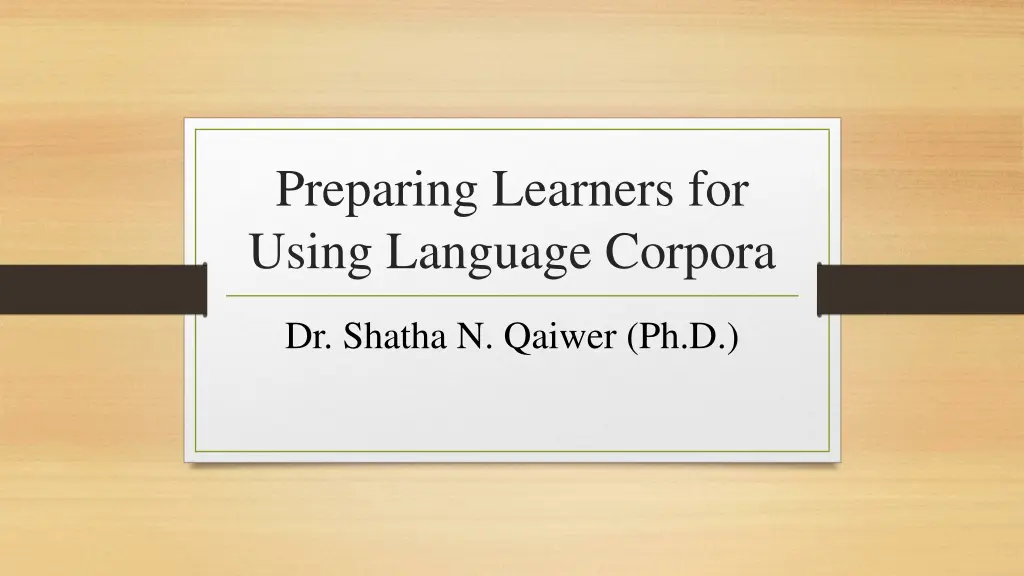
Using Language Corpora in Language Learning: Strategies and Tools
Discover how to prepare learners for utilizing language corpora with survey techniques, hypothesis testing, self-error correction, and learner-as-researcher approach. Explore methods for engaging students in uncovering language patterns and verifying hypotheses using corpus data for effective language acquisition.
Download Presentation

Please find below an Image/Link to download the presentation.
The content on the website is provided AS IS for your information and personal use only. It may not be sold, licensed, or shared on other websites without obtaining consent from the author. If you encounter any issues during the download, it is possible that the publisher has removed the file from their server.
You are allowed to download the files provided on this website for personal or commercial use, subject to the condition that they are used lawfully. All files are the property of their respective owners.
The content on the website is provided AS IS for your information and personal use only. It may not be sold, licensed, or shared on other websites without obtaining consent from the author.
E N D
Presentation Transcript
Preparing Learners for Using Language Corpora Dr. Shatha N. Qaiwer (Ph.D.)
Finding Out What Students Know? Survey techniques Class Discussion or Questionnaire: What learners already know? What are their attitudes towards the corpus-based approach Acombination of survey format can be used as scales, ranks, or checklists Asurvey may be outlined as follows: a) Part1: General info about corpora b) Part2: test on basic corpus terminology c) Part3: Corpora and corpus information tools d) Part4: Experiences with corpus-based material e) Part5:Attitudes towards corpus-based activities/ Problems of using language corpora The teacher may give quizzes or test to find out whether students really know what they report in the survey
Learner as researcher/ Discovery Learning Use language corpora to uncover language patterns and use Take the role of a researcher or language detective in which their generalization (finding) are drive by corpus data (data-driven learning or Discovery Learning Learners act as travelers exploring a corpus to find possible answers o their linguistic queries. Learners should base their conclusion on a fairly large and general corpus to avoid the trap of overgeneralization They should be trained to query the data .
Hypothesis Testing May form hypothesis regarding meaning or use of particular words or phrases and consult a corpus to rejector confirm such hypotheses. Ex, when signaling cause and effect , owing to seems to correlate with negative situations whereas thanks to occurs with positive ones. ( The Bank of English corpus confirms that) [ bad weather, inability ] [ Thanks to latest technology ] Concordances may reject a hypothesis. Ex most EFL teachers prescribe that ever never used in the perfect aspect in an affirmative sentence. But learners who search the BNC will find examples where ever is used with superlative adjectives in a statement such as This is the most beautiful place I have ever been or It was the worst performance we have ever given.
Self-error Correction Todd (2001) asked students to choose two misused content word for self- correction consulting data from a web-based concordance such as alltheweb or webcorp Chambers (2006), students used the corpus data to revise their first draft writings in a number of areas of grammatical and lexical errors. Students can brows a general corpus to induce rules or patterns in the revision process. They can exploit a learner corpus which consists of texts written by learners to compare ad contrast their own writings with texts retrieved from native speaker corpora which can help them correct language mistakes in their writing tasks
Learn about a Genre They can learn about different text types such as narratives , newspaper articles and academic essays. Ex. Corpora made up of texts in a particular genre can reveal words, phrases, or patterns typical to that text type. These can help students learn about distinctive lexico-grammatical pattern which characterize a particular move such as reporting clauses in academic citations or language features in different stretches of lecture introductions to carry out genre analysis, they can make sue of specialized corpora but they also need to learn to compile their own corpora composed of specialized texts to address their specific queries.
Generating targets for self-study in specialized areas Learners can do other tasks on specialized corpora such as generating a word list based on texts under examination as done in large scale studies such as that of Coxhead and Nation(2001) They can come up with a small glossary or terminology or simply create a word list which reflects their needs and at a later stage methodically learn these words If they decide to do tasks of this nature, they should be guided all through the process of compiling their own corpus with emphasis on criteria for choosing texts such as corpus size, number of texts and authorship
